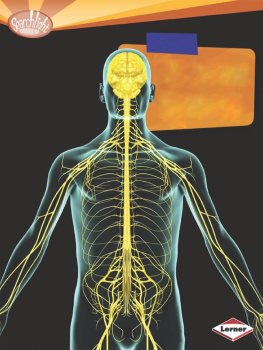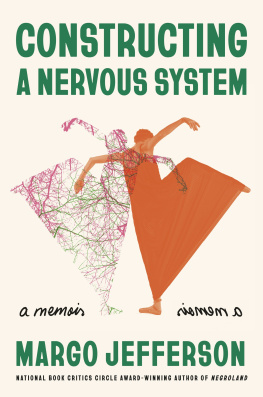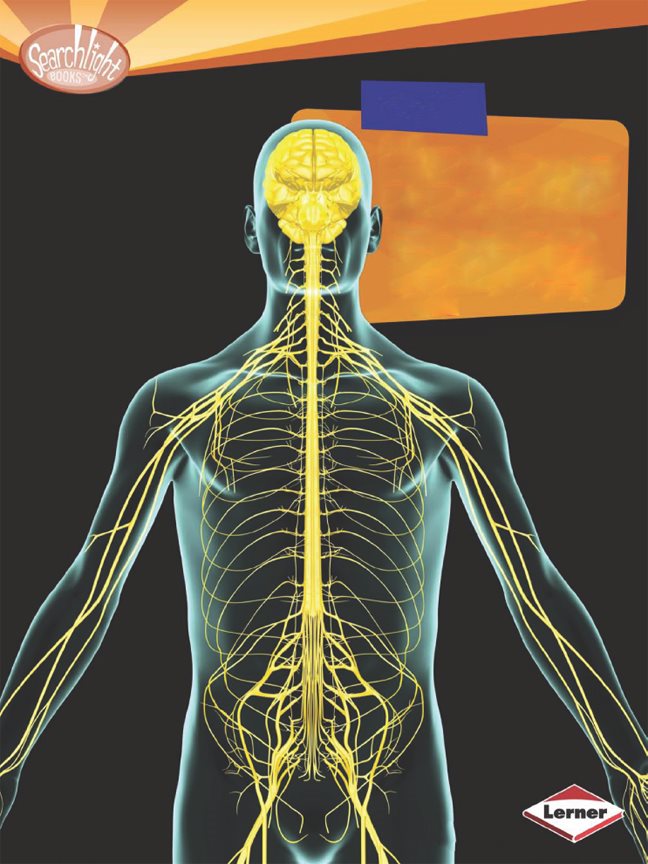Your
Nervous
System
Joelle Riley
Copyright 2013 by Lerner Publishing Group, Inc.
All rights reserved. International copyright secured. No part of this book may be
reproduced, stored in a retrieval system, or transmitted in any form or by any means
electronic, mechanical, photocopying, recording, or otherwisewithout the prior written
permission of Lerner Publishing Group, Inc., except for the inclusion of brief quotations in
an acknowledged review.
Lerner Publications Company
A division of Lerner Publishing Group, Inc.
241 First Avenue North
Minneapolis, MN 55401 U.S.A.
Website address: www.lernerbooks.com
Library of Congress Cataloging-in-Publication Data
Riley, Joelle.
Your nervous system / by Joelle Riley.
p. cm. (Searchlight booksHow does your body work?)
Includes index.
ISBN 9780761374503 (lib. bdg. : alk. paper)
1. Nervous systemJuvenile literature. I. Title.
QP361.5.R54 2013
612.8dc23 2011044176
Manufactured in the United States of America
1 CG 7/15/12
Contents
THE CENTRAL
SYSTEM ... page
Chapter
THE CENTRAL
SYSTEM
Your body has many systems.
A system is a way of doing things.
Your bodys systems help it do the
things it needs to do to stay alive.
Your body is like a
complicated machine.
What are some of
the things happening
inside your body?
Your muscles and bones help you move. Your heart
pumps blood through your body. Your lungs bring in air.
And your stomach breaks down the food you eat. But
what keeps all these systems working?
Your bodys systems
help you do things
such as playing games.
Command Center
Your nervous system
controls all the other
systems. It keeps track of
everything that happens in
your body. Your nervous
system tells your other
systems what to do.
Without your nervous
system, none of your
other systems could do
their jobs.
Your nervous system keeps all
your other systems working.
It also helps you to think.
But your nervous system does much more than
just control your other systems. Your nervous system
helps you dance. It helps you solve puzzles. It helps you
laugh. It helps you remember the names of your friends.
It helps you see flowers and hear music. It even helps
you dream.
YOUR NERVOUS SYSTEM TELLS
YOUR MUSCLES HOW TO MOVE.
THE BRAIN TELLS THE
MUSCLES WHAT TO DO
brain
eye
message from the
eyes to the brain
message from
the brain to the
cord spinal
spinal
cord
When you see something interesting, your eyes send a message
to your brain. Your brain decides what to do and sends a
message to your spinal cord.
brain
message from the
spinal cord to the
muscles
muscles moving
the arm
spinal
cord
Your spinal cord passes the message on to your muscles.
The message tells your muscles what to do.
Parts of the Nervous System
Your nervous system is made up
of your nerves, your spinal
cord, and your brain.
Nerves carry messages
to and from all parts
of your body. Your
spinal cord connects
your nerves to your
brain. Your brain
thinks. It keeps
track of everything
that happens in
your body. It tells the
other body systems
what to do.
This picture shows the inside of
a persons head and neck. The
colored parts of the picture show
the brain and the spinal cord.
Chapter
NERVES
Your nerves are made up of
special cells called nerve cells.
A nerve cells job is to collect
messages and pass them on.
A microscope was
used to take this
picture of nerve cells.
What parts does a
nerve cell have?
Each nerve cell has a body, a tail, and branching parts
that look like hairs. A nerve cells hairs collect a message.
The message travels through the hairs. It goes through
the cells body. Then it moves down the tail. The tail
passes the message to hairs on another nerve cell.
A NERVE CELL
cell body
tail
message
branching
hairs
The Size of Nerve Cells
Nerve cells are tiny. You would need a microscope to
see one. But many nerve cells are bundled together to
make nerves. Nerves are big enough to be seen without
a microscope.
THIS PICTURE SHOWS THREE
NERVE CELLS UP CLOSE.
Receptors
Some nerve cells collect messages from your skin or
from other parts of your body. These nerve cells are
called receptors. Receptors collect information from the
world and from your body.
The nerve cells in this picture are
deep inside a persons ear. Nerve
cells in this part of your ear collect
information about the sounds you hear.
Receptors in your skin, ears, eyes, nose, and tongue
collect messages from the world around you. Other
receptors collect messages from inside your body.
Nerve cells pass these messages to your cord spinal or
your brain.
Special cells inside the eye
collect information about
things that you see.
Other nerve cells
collect messages from
your brain. Then the

























